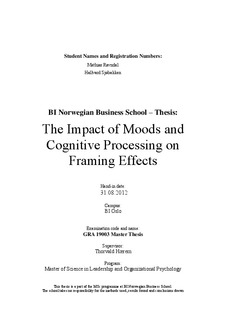The impact of moods and cognitive processing on framing effects
Master thesis
Permanent lenke
http://hdl.handle.net/11250/95050Utgivelsesdato
2013-02-18Metadata
Vis full innførselSamlinger
- Master of Science [1621]
Sammendrag
This study examined the effects of mood and cognitive processing on risky choice framing. A mixed between- and within-subject lab experimental design was conducted to investigate our hypotheses. As predicted, the results indicate that cognitive processing moderated the effects of scenario framing, with higher levels of intuitive processing leading to classical framing effects, whereas higher levels of analytical processing leading to no such framing effects. Self-reported valence, as in self-rated positive or negative mood, was found to significantly account for variation in cognitive processing. Cognitive processing was, however, not found to mediate the relationship between induced mood and framing effects.
Beskrivelse
Masteroppgave(MSc) in Master of Science in Leadership and Organizational Psychology - Handelshøyskolen BI, 2013
